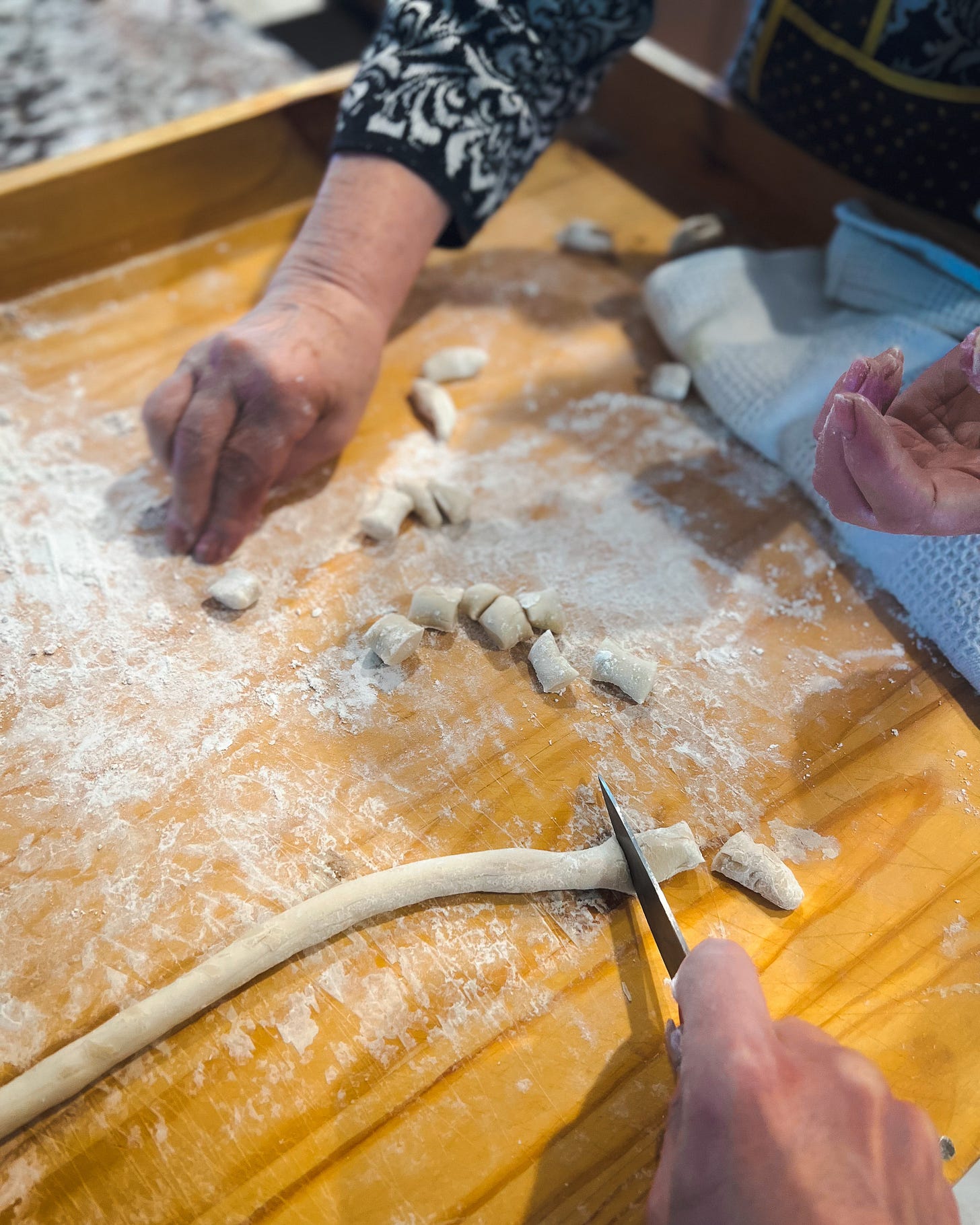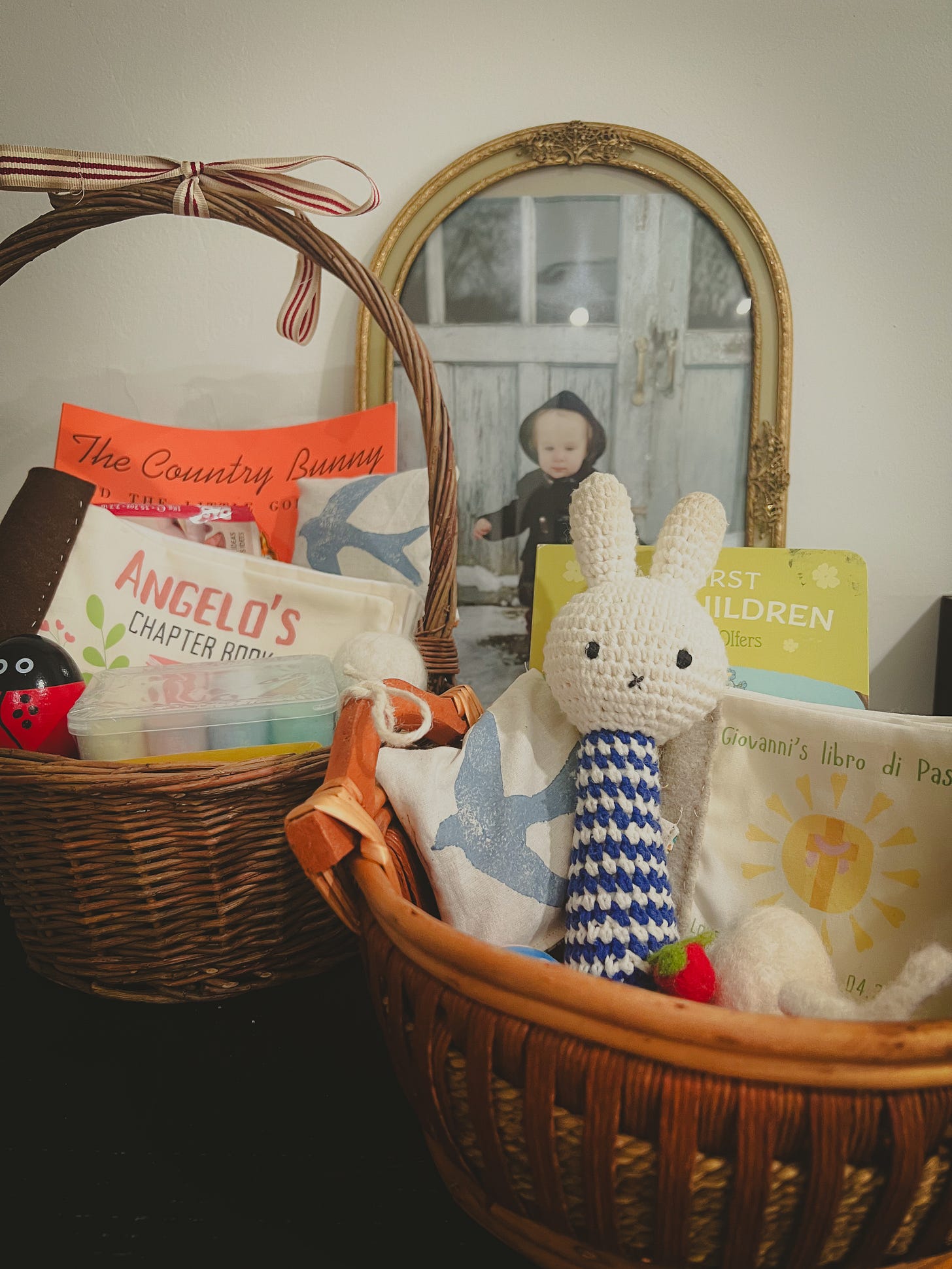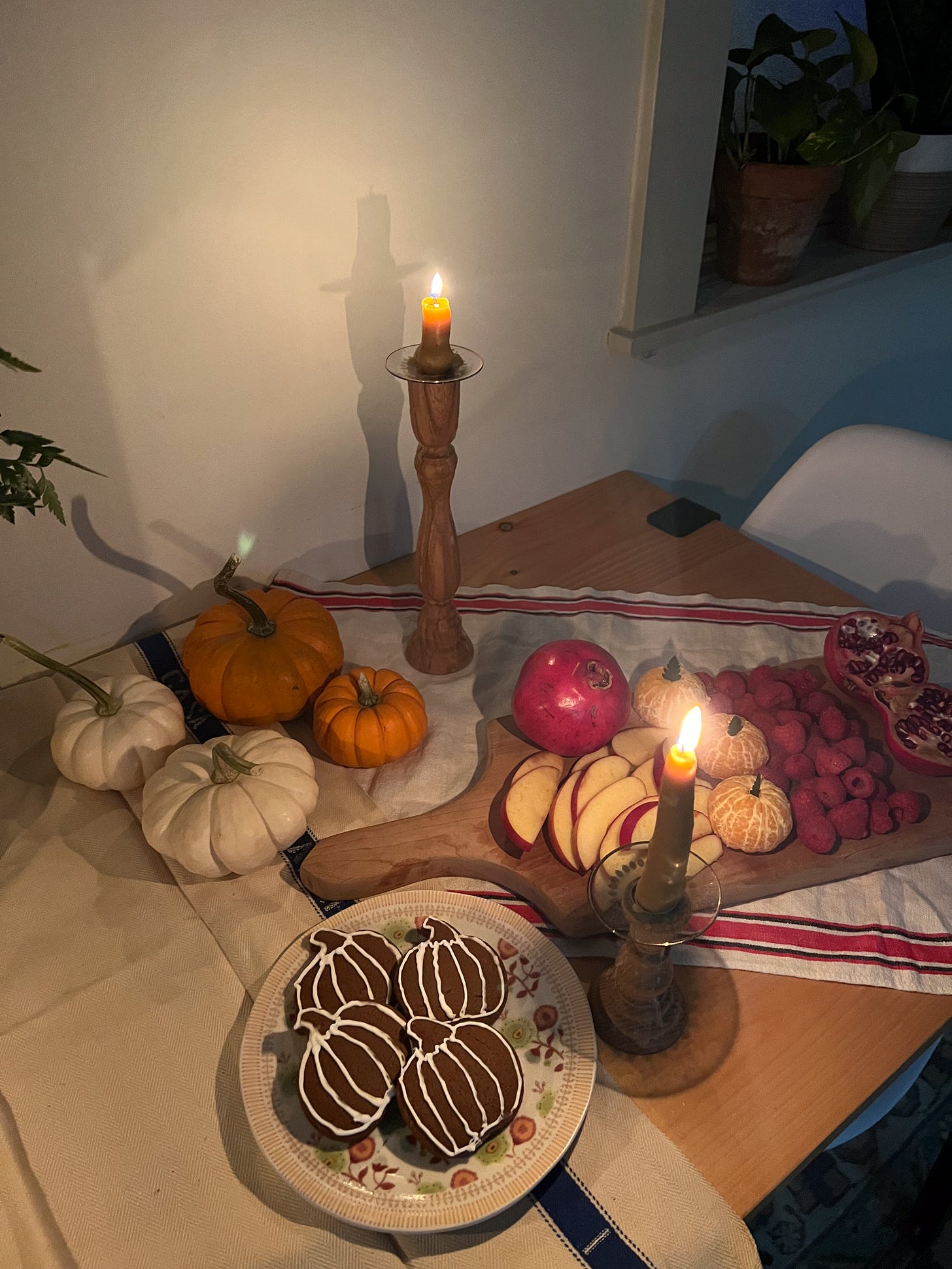Paid subscribers can listen to me read this essay by clicking on the player below!
At the beginning of this year, I was a guest on the “Homemaker Chic “podcast, talking about the art of making family life vibrant and memorable. In her introduction,
mentioned that the things I’m often creating for my kids, from quilts to sweaters to handmade books, are part of the reason she and co-host wanted me on to talk about this topic. I explained in the episode that I take time to make things because I’m interested in creating what I call an “heirloom quality life,” not only to improve the pleasure of the present moment—in other words, the beauty and caliber of my family’s every day—but for the future. I want my sons, who will one day, like all of us, have only the memories of their upbringing to look back upon, to have reflections of quality and care, as well as some of the actual items of their youth. For most of time things were made to last. From iron nails to clothing, things were built to pass the test of time. What will our children have if everything we hand them is designed to be discarded?The best way I can describe an heirloom quality life versus a convenience one is to tell you about my mother’s birthdays. My mother’s house is the center of her children and grandchildren’s lives. I sometimes go to my sister’s house, but much more often, we spend time together at my mother’s. On occasion I eat dinner at my sister’s house, almost never at my brothers’ houses, but several times a month we all eat dinner together at my mother’s. Mothers are the beating heart of their families, drawing blood and life toward them and sending it back out into the world strengthened. Sangue del mio sangue, the Italians say of their children. Blood of my blood.
There have been a few times when, wanting to give her a break from cooking on her birthday, we’ve met at her house and, in an effort to simplify, ordered Chinese takeout. We set the table just like always, sat at our usual spots like always, only to embark on a dinner that felt like…well, not like always. The food was there, but the magic was missing. We gathered round, but the fire was absent. The heirloom quality of the evening—my mother’s homemade cooking—was lacking, and convenience, devoid of the same power, love and care, just couldn’t fill the void.
My mother raised us on macaroni with red sauce made from tomatoes our family jars together in the heat of summer. Those tomatoes aren’t only high quality, heirloom quality, to the taste, they’re heirloom memories, as few events are more cherished in an Italian-American kid’s upbringing than the summer ritual of jarring tomatoes. She gave us something of quality to enjoy as food and as experience. My mother fed us on milky mozzarella we drove all the way to the Bronx to purchase, because it was made fresh and tasted closest to the mozzarella we’d find in Italy; again, the focus was on transcendence, both in taste and in experience, as some of my fondest memories include me sitting in the back of my parents’ station wagon, watching my mother in the passenger seat pulling open a freshly baked roll, unfolding the packages of waxy butcher paper and laying slices of fresh mozzarella and mortadella onto the bread, then handing one to me, another to my father, so that we enjoyed the panini on the ride back home. She raised us on frittatas made with zucchini just plucked from the garden, as well as zucchini flower fritters, another summer tradition, made from flowers she picks early in the morning, before the ants and bees have a chance to hide inside their petals. Our family is divided on which is the proper topping for a zucchini flower fritter, salt or sugar, and we stand around her kitchen island, hovering around our respective bowls of white granulars, arguing with the other side that they’re doing it all wrong. The food isn’t fast, and neither are the experiences and memories they draw to them. My mother gives us food meant to be more than something merely shoveled into our mouths. She gives us an inheritance.
Food is my mother’s way of showing love, and her way of giving us an heirloom quality experience. Things we create with time and intention, from food to clothing to gifts, are expressions of love meant to last long after the dishes have been cleared and the tablecloth shaken over the back yard. On those takeout birthdays, even my mother felt the absence of that special something and remarked that it wasn’t, indeed, the same. Food is the magnet that draws people together. The more heirloom quality it is, the stronger the pull.
Merriam-Webster tells me an heirloom is 1) : a piece of property…that descends to the heir as an inseparable part of an inheritance of real property 2) : something of special value handed down from one generation to another 3) : a variety of plant that has originated under cultivation and that has survived for several generations usually due to the efforts of private individuals.
An inseparable part of an inheritance…handed down from one generation to another…a variety that has survived due to the efforts of private individuals.
That last definition lingers. An heirloom isn’t something a big corporation is interested in. It’s not something the government wants to give you. You won’t find it on meta. It’s in the hands of individuals, of ordinary, everyday, real people who care about those around them and who want to make their brief, fleeting time on earth as beautiful and memorable as possible. In our everyday choices, in the small atmosphere of our homes, we resist a throw-away life as an act of self-respect. As mothers, what greater gift can we give our families than creating a space that says, Our lives are worth something.
Growing up, there wasn’t a focus on convenience and efficiency. This doesn’t mean we didn’t have aspects of both, but they weren’t the ethos we lived with. Things were often done the labor intensive way, because the labor intensive way bore the best fruit. Wine was better when you made it yourself, so was soppressata and salami. Vegetables were tastier when you grew them yourself, and pies were better when they were homemade (although my mother did begin to use store-bought pastry crust!) Packaged food didn’t have the same spark, and it lacked the soul-satisfying reward of having created something with your own hands. Fast food might temporarily quell hunger, but it couldn’t illuminate an evening.
We had an array of backyard birds, from chickens to quail and peacocks, and taking care of them took work, too. We had an American drip coffee machine but more heavily used was the Neapolitan coffee pot, and I spent many moments of my youth unscrewing and screwing Neapolitan espresso pots, filling them with water and grinds to boil on the stovetop. My mother canned wild mushrooms that my father foraged, hauling home garbage cans worth of their elaborate blooms for her to clean and prepare. She preserved eggplant, green tomatoes, red tomatoes, peppers stuffed with sharp cheese, anchovy and caper, and baked fresh bread weekly. We enjoyed homemade pizza and freshly picked backyard basil, and it rubbed my parents the wrong way to see us kids try and take the easy way out of anything. The good stuff, the heirloom quality stuff, asked for our time and attention; because you gave both, it’s rewards were double fold. The homemade life not only filled our bellies, it filled our souls, gave us something to be proud of and showed us how to create for ourselves. It gave us tradition. A something to which we felt we belonged.
Nowadays people have a lot of nothing, and it strangely consumes most of their time. We’re too busy to make what we can buy and to sit with one another when we can just keep going. I’m not immune to this push, and I’ve found that doing things the labor intensive way is a means to remediate the rush and whirl of the alacrity with which our lives are now passing. I go through the trouble of making things, or sourcing well made things, precisely because it slows me down. It brings me back to a pace that makes life feel worthwhile, and I want to model that for my kids, and give them a sense that some things can indeed last.
Artificial Intelligence is going to take over humanity. There’s debate about this among so-called smart people (like scientists) but as with many things of this magnitude, you don’t need a Nobel Prize to read the writing on the wall. All you really need is a set of eyes and a bit of experience. People are already engaging in “romantic” relationships with robots, and this will only become more normalized, just as staring down at a small computer to check in on your virtual “friends” when you’re surrounded by actual friends has become normalized. We have to decide, each of us, for ourselves and for our families, at what pace and with what spirit will we live—man or machine?
The other night I dreamt of my dead father. In the dream there was a ferocious push from evil forces, and me and others were trying to fight them back. In the midst of chaos and fear, my father appeared beside me. At first, he was trying to help, trying to protect me and give me aid, but it seemed not enough. We were walking along a dark street and things were on fire around us, glass broken, the horror of end-of-the-world movies and the like (what, you don’t have dreams like this? Ha!), and he stopped, drew a long gold chain from his neck, which had at its end a pendant of La Madonna, of the Virgin Mary, and slid it around my neck, wordlessly, as if to say, I can’t help much more. This is a job for mothers.
In this world we live in, the heirloom quality life just might be the antidote to blatantly inhuman forces, which seem to be gathering and thickening day by day. Mothers, the beating heart of families, the keepers of homes, will need to be the ones to administer the remedy.
Happy Mother’s Day to all the mothers in our lives. Stay strong, stay wild, stay slow….
Thanks for being here with me, truly.










